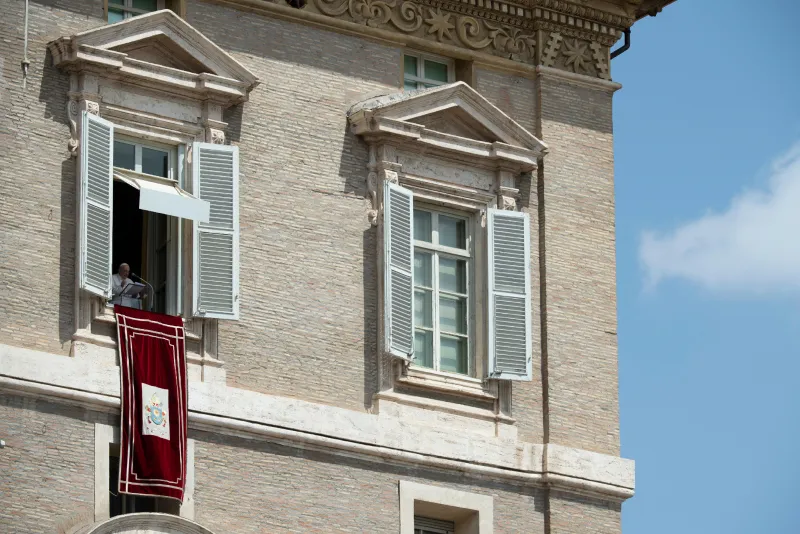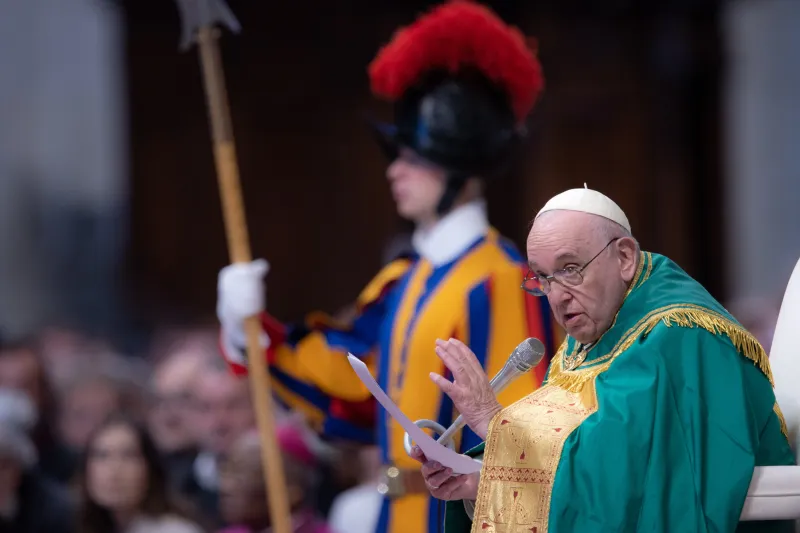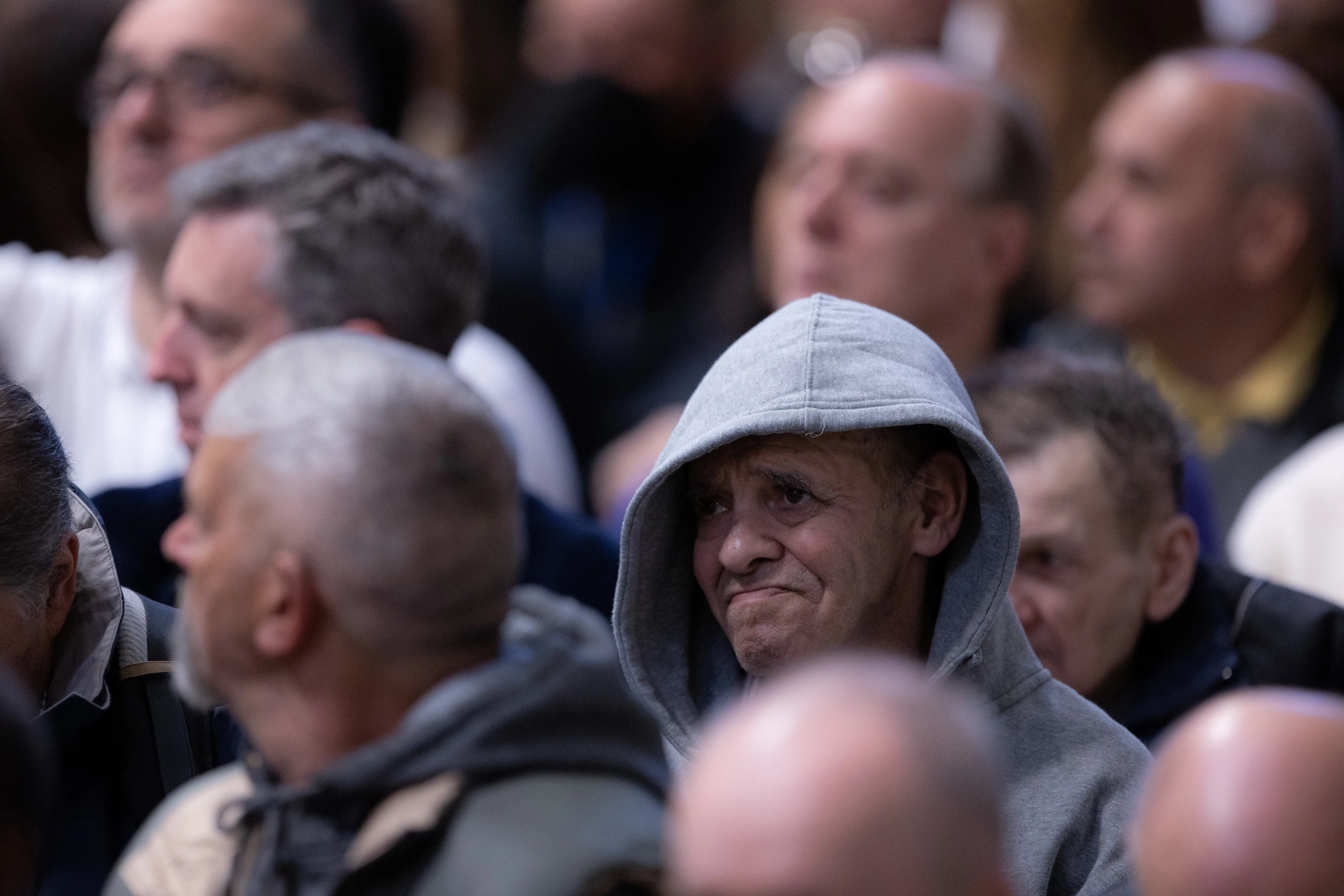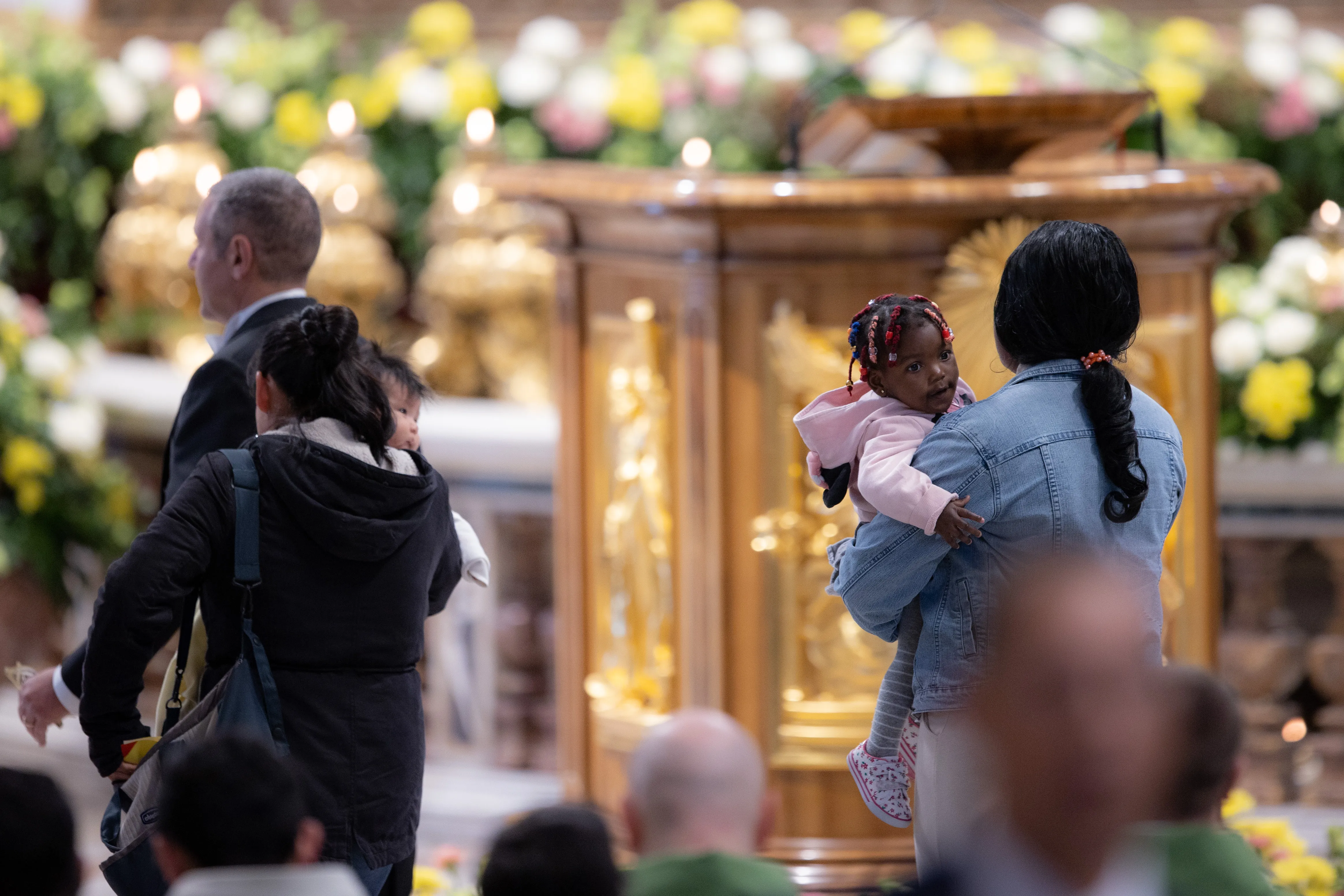
It would not be quite accurate to describe the Working Document for the October 2023 Synod (its Instrumentum Laboris, or IL) as “disappointing.” No one who has followed the “synodal process” underway since 2021 could reasonably have expected an IL of spiritual depth and evangelical passion — an IL that reflected Pope Francis’s early summons to the Church to be “permanently in mission:” a Church of missionary disciples bringing the Good News that “the Kingdom of God is among you” (Luke 17:21) to a world suffering from its allegiance to false gods.
The better description of the IL, it seems to me, is that it’s vacuous: a great deal of clotted, trendy sociologese with a thin veneer of Christian language and imagery. The net result is a portrait of the Church that rather completely misses the central teaching of the Second Vatican Council.
How is the IL vacuous? Let me count (some of) the ways:
The IL is Christologically vacuous. Subtract the few passing references to the Lord Jesus, and the IL reads as if it were prepared for an international non-governmental organization seeking to increase members and donors for its program of good works. The IL occasionally traces its lineage to Vatican II’s Dogmatic Constitution on the Church. Yet that fundamental text begins, “Jesus Christ is the light of the nations.” No such affirmation appears in the IL, which is steeped in the ecclesiocentrism — the self-referentiality — once deplored by Pope Francis. Vatican II was profoundly Christocentric; the IL is anything but Christ-centered.
The IL is pneumatologically vacuous. The IL speaks at length of “conversation in the Spirit” in which “the Holy Spirit makes his own voice resound.” But the IL says nothing about how the Church differentiates between the authentic voice of the Holy Spirit and the spirit of the age, which St. Paul warned the Romans to avoid (cf. Romans 12:2). Nor does the IL affirm that the “voice of the Holy Spirit” can never be self-contradictory, teaching the Church one thing at a particular historical moment and its opposite at another. The IL speaks at some length about “discernment,” but does not explain why the “discernment” that has taken place over the past two years of the synodal process yields the agenda of the evangelically moribund Catholic Lite project, the charred ruins of which are evident in Germany.
The IL is ecclesiologically vacuous. Over and over, the IL explores what a “listening” Church — with which it identifies “synodality” — does. Very little is said about a teaching Church fulfilling the Master’s command in the Great Commission: “Go and make disciples of all nations…teaching them to observe all that I have commanded you” (Matthew 28:19-20). The Church’s ordained pastors seem reduced to what the IL describes as “facilitators capable of accompanying communities in practicing [conversation in the Spirit] as a priority at all levels of ecclesial life…” Moreover, the IL fails to address two questions raised numerous times during this “synodal process:” How can a Church permanently in meetings be a Church permanently in mission? And how can a process in which (at best) 1% of the Church has participated be considered an expression of the sensus fidelium, the “sense of the faithful”?
The IL is woefully lacking in moral theology. There is no statement in the IL that the Beatitudes are the Magna Carta of the Christian moral life, or that the Ten Commandments and the moral teaching of the Church are guideposts leading us to personal happiness, social solidarity, and ultimately beatitude: eternal life within the light and love of the Thrice-Holy God. Rather, the “listening” to which the IL summons the Synod of October 2023 seems largely directed to questioning the enduring, binding character of moral truths the Church has taught definitively, on the basis of both revelation and reason.
The IL is methodologically childish. The “Synodal Assembly” in October 2023 will have little or no freedom to define its purpose or agenda. These have been defined already by a series of “Worksheets” appended to the IL, which pose questions the members of the Assembly are instructed to address in plenary sessions and language-based working groups. (And who can doubt that the latter will be provided with “facilitators” by the Synod General Secretariat?) The general impression the IL Worksheets give is that the Synodal Assembly will be something akin to a kindergarten classroom: “Color between the lines, girls and boys.”
There is much in the Church in need of renewal and reform. The Working Document for the Synod on Synodality does not advance that cause. Nor does it reflect the Christocentric teaching and spirit of Vatican II.
If you value the news and views Catholic World Report provides, please consider donating to support our efforts. Your contribution will help us continue to make CWR available to all readers worldwide for free, without a subscription. Thank you for your generosity!
Click here for more information on donating to CWR. Click here to sign up for our newsletter.










A vacuous document issued by an apostate Vatican. Who would have ever thought that possible.
Earth to Francis: The Church is poised to move on from you and your ilk.
The 1970 missal of Pope Paul VI refers to priests as Presiders. The watering down of our faith started many decades ago.
Our Lady of Lasalette said that Rome would lose the faith. I used to wonder what the embodiment of that statement would look like – I wonder no more. One can no longer hold the conviction that those in the higher echelon of the church of Rome are making their decisions to advance the faith. Everything we see coming out of the papacy now seems to be delivering the church to the “spirit” of the world. One who is still attending the NO Mass needs to prepare now – it will become another Petrie dish of “experimentation”. Confusion is an inevitability; the identity crisis will deepen and disillusion will result in another exodus from the chaos. It will all play out in the Mass. Seek out a Latin Mass. Attend. In God’s mercy, it is your lifeboat as the Barque of Peter is intentionally guided into the rocky shoreline.
Thank you,George, well put. The barque of Peter is taking on water and the next Pope (may God bless him) will need to patch the holes and make major corrections and face the waves head on. Many may be lost over the rail, but the ship will not go down and will reach its port safely. The storm may be raging now but the son is still shining brightly overhead! 🙂James
I agree, very well put, George, even superlative.
Hope I’m not being erroneous and uncharitable but I have to wonder whether this whole synodal movement is not just a smoke screen for the Lavender Mafia’s not-so-hidden agenda to change the Church’s moral teaching.
Not only does the alleged sensus fidelium of the flip-chart synodal thing lack the missing 99% of the laity, but (and as Weigel clearly explains) it wanders not only from the faithful laity, but also from faithful members of the apostolic succession of the present and, lo, of the past two millennia–the Magisterium thing.
Sensus fidelium: “the supernatural appreciation of faith on the part of the whole people, when, from the bishops [!] to the last of the faithful, they manifest a universal consent in matters of faith and morals.”
The sad thing is it doesn’t end with this unfulfilling document. The synod itself will be a disaster.
Is the Holy Spirit calling us , in exposing what we think we are lacking in , to look around- October related to Fatima and the Miracle of the Sun – of our Mother as Queen of universe . The Synod as a call to learn from each other too and would it be good to discern what helps our Muslim brethren to be diligant in fasting and also showing such reverence in using the name of their prophet – ? His mercy through the many who were converted forcibly, to include the blessing – ‘Peace be upon..’ – His Peace to be set free from spirits of errors and vindictiveness ..
Mariam -intervening as at the Wedding at Cana to keep the Covenant to an extent… Would it not be good if we Christians can use the occasion to allow our Mother to help us too, to draw the waters , to help form the New Wine of rejoicing in The Lord, in what He can do along with The Mother- in looking at our debts and what we do not have – marital stability , gratitude for life and purity …and allow the Holy Spirit to work even silently to see what break throughs can be as a miracle – as what has been asked for by Holy Father .
Peace !
Why on earth are you referencing Islam? Do we not have the Gospel? Sorry muslims may fast very expertly and defend their fellow usually with threat and violence. No thanks if Jesus Christ is not enough of a role model for us then we are truly lost.
Glad that you asked , having forgottten to mention the occasion when the Holy Father had called for fasting till 3 P.M , on the occasion of the Syrian war – seems like a good adaptation instead of the day time fasting as advocated in Islam ; a people who do not accept the Passion of The Lord , thus owing Him less gratitude than us – reason for less graces too in forgiving , thus the violence yet as a group remarkable in their fidelity to fasting ..and is same a gauge as to whether we have become lukewarm – worthy of being spat out, from ‘deep loathing ‘ – words of 9th day of Divine Mercy Novena – https://www.thedivinemercy.org/message/devotions/novena/ninthday
Mercy !
One would think that after all the battles, mainly losing, that the mainline Protestant churches have gone through with their “modernizing” theology, Rome would have learned something useful about what not to do. Alas, that seems not the case.
The continued barrage, like this piece and many others here in CWR and in many conservative and most radical traditionalist Catholic media platforms, aimed at anything of and by Pope Francis is expected and understandable. But this hyteria about the IL of the coming Synod on Synodality is simply misplaced and overdone. The description terms usually lobbed by the enemies of Pope Francis questioning his orthodoxy is shining through here: ambiguous, confusing, unclear, dubious, etc. Come on. It is only a working document still up for discussion during the synod itself. It is not yet final. This is not a teaching document. It is confused writeups like this that appear to blur the line between what is not final from final about a teaching document that muddle the discussion and make the ordinary magisterium of Pope Francis confusing.
I will pray for you. That’s all that can be said after what the Church has suffered with this pontificate.
“Hysteria”? In what way has any piece here at CWR, including this piece, been hysterical?
“Come on. It is only a working document still up for discussion…”
That’s just a tad bit naive, with all due respect. Ten years into this pontificate, the approach taken to the various synods is quite obvious. The main actors are well-known and their ideological hobby horses are mostly in public. The DCS and IL documents are quite dreadful in terms of thought, writing, construction, rhetoric, theology, etc., etc. Can something good come out of the October Synod? Yes, absolutely. But not by following the rhetoric, through, and implications of these documents. It’s going to require bishops to dial down to root causes, agendas, assumptions, and to demand their actually be some Catholic substance to the month-long proceedings in Rome.
Agreed. If the Church really is Pope Francis’ “field hospital,” October 2023 is probably the time for a life-saving amputation of the gangrene. So, yes, “something good [can still] come out of the echo-chamber Synod on Synodality”…
As for the “gangrene,” in less than 27,000 words, is it “ecclesial transgenderism”?
…the subliminal/explicit notion, both, that what the Church IS can be displaced by what the Church DOES. Councils and synods are what the Church does. (Likewise, the displacement of sound moral theology by a focus group plebiscite.) In the 4th century, Arius would have debased the nature of God; in the 21st century, too much of “aggregated, compiled and synthesized” synodality–as now practiced–debases the nature of the Church and the nature of man.
So, now, how to unscramble the omelette?
I believe it’s true Carl, “main actors are well-known and their ideological hobby horses are mostly in public” – over ten years, I say it has been coming forth over the last 3 decades. It can’t be attributed to 1 individual so they have been saying during that whole period “it’s the Holy Spirit”. Even today, June 29 2023, you hear the same mantra, “the protagonist is always the Holy Spirit”.
So what is happening is they have been collating through some duration preceding the onset of the “synod on synodality” actual announcement, the content of it, some already expressed and some latent that had to find its formula. Because, these are what I have heard and seen already right where I live -all of it.
In context, headlining it as, that they “don’t have an agenda”, is not the face or heart or inspiration of the priesthood in Jesus Christ.
A Pope who has dismissed the entire received tradition of Catholic thought as museum pieces for the mentally ill on multiple occasions, who has insisted that truth is fungible because God Himself is capable of changing His mind about what is right and wrong or true and false, and frequently does, is not any sort of bedrock of orthodoxy, and those who notice are suffering from something other than pointless hysteria.
It seems to me that the goal of the Synod on Synodality is to drive as many people out of the Church as possible. As evidence, the poster child for the Synodal way is the Church in Germany. The following link is to The Pillar article which provides the numbers of people who have left the German church over the past 10 years. Pay close attention to the first graph:
https://www.pillarcatholic.com/p/german-catholics-left-church-in-record
One advantage of being an historian and having read the history of the popes, is perspective and not to be to concerned about how the current Holy Father is living out his vocation. There was one pope in 10th century Rome whose powerful mother engineered his election at the age of 19. He decided he wanted to get married and sold the papacy to his uncle like, as one historian put, “like box of old shoes.” The papacy survived. One very important positive in this whole business is the modernist influences and its sad consequences are there for all to see. This too shall pass. We need to pray for the poor souls who are either deceiving or being deceived and be aware of our limited understanding of this situation. Jesus we trust in You.
I respect George Weigel, but he seems to have missed what is said in no. 38 of the Instrumentum about what is needed to recognize the voice of the Lord:
“The more each participant has been nourished by meditation on the Word and the Sacraments, growing in familiarity with the Lord, the more he or she will be able to recognise the sound of His voice (cf. Jn 10:14.27), assisted also by the accompaniment of the Magisterium and theology. Likewise, the more intentionally and carefully participants attend to the voice of the Spirit the more they will grow in a shared sense of mission.”
Being nourished by the Word of God and the sacraments and being assited by the Magisterium and theology seem to be be quite traditional Catholic means of discernement.
Yes this sounds very catholic and traditional, the problem is with the rest of the document. Would you sign a contract after reading it and saying, well the majority of the contract is very onerous and unjust but the last paragraph seems ok. Error and ambiguity in the faith must be rejected.
‘Our oneness is in our wounds ‘ – words of the Holy Father – wounds as hardness of hearts that make it difficult to recognize sacredness of human lives and thus often tempted to focus on the negatives alone, depriving us of the grace to be united in the Sacred Heart to praise togther , converting the occasions when the wine ran out to be one of prasing our Lord with our Mother , for every drop of light and every heart beat , every thought in oneness with that of His – as compassion for the suffering and gratitude for beauty and goodness in and around to also taste sweetness of forgiveness and mercy …..
The theme of fasting – O.T talks about how the sins of the laity afflicted the priesthood ; there is no dearth of same in our times .
Along with the steps taken for Eucharistic revival, many of the local churches can take steps on their own – dividing up the parish by zip codes as ‘family units ‘ for the unifying step of fasting days chosen/ assigned to each through out the year – specific causes , such as to prevent and end wars – both internal and external ,on occasions of scandal/ discords, to free the addicted including to food / media etc :.
Custom of making charitable donation when difficult to fast also a worthy adoption .
Lay persons – Knights etc: coordinating same can have benefits .
Let us invite our Mother with more zeal – to make things move ‘before time’ – to let the Light of The Spirit rise, to rejoice in walking with the Holy Family as Octobers draw near .
Have heard lots of musing about what a useless and vacuous document it is.
Have heard no musing about how they intend to use it.
‘ The Holy Father noted that the new Prefect has long been valued for his theological charisma in his posts as dean of the Faculty of Theology of Buenos Aires, president of the Argentinean Society of Theology, president of the Faith and Culture Commission of the Argentinean Episcopate, rector of the Pontifical Catholic University of Argentina, where he said, he encouraged a healthy integration of knowledge. ‘
https://www.vaticannews.va/en/pope/news/2023-07/pope-letter-new-prefect-dicastery-doctrine-faith-fernandez.html
‘ In his Address to the Delegation, Pope Francis highlighted the values of unity and peace. He expressed his joy at the outcome of the Plenary Session of the Joint International Commission for Dialogue between the Catholic Church and the Orthodox Church, which resulted in a document on Synodality and Primacy in the Second Millenium and Today.
“It was important”, he said, “to have engaged in a joint reading of the way in which the relationship between synodality and primacy developed in East and West during the second millennium.”
Today, he continued, “we are called to seek together a modality of exercising the primacy that, within the context of synodality, is at the service of the Church’s communion on the universal level”. ‘
https://www.vaticannews.va/en/pope/news/2023-06/full-unity-is-gift-of-the-spirit-pope-tells-orthodox-delegation.html
‘ Only then, he continued, “did Peter arrive at the spiritual maturity that brought him, by grace, to so clear a profession of faith.”
Peter, the Pope said, “was to learn everything day by day, as a disciple, a follower of Jesus, walking in his footsteps.” ‘
https://www.vaticannews.va/en/pope/news/2023-06/pope-francis-mass-solemnity-peter-paul-follow-proclaim-pallia.html
‘ Pascal, the Portuguese Cardinal said, is one such beacon, because he “brings everything together”: science and faith, philosophy and mathematics, spirituality and a practical mindset. ‘
https://www.vaticannews.va/en/pope/news/2023-06/pope-blaise-pascal-anniversary-letter.html